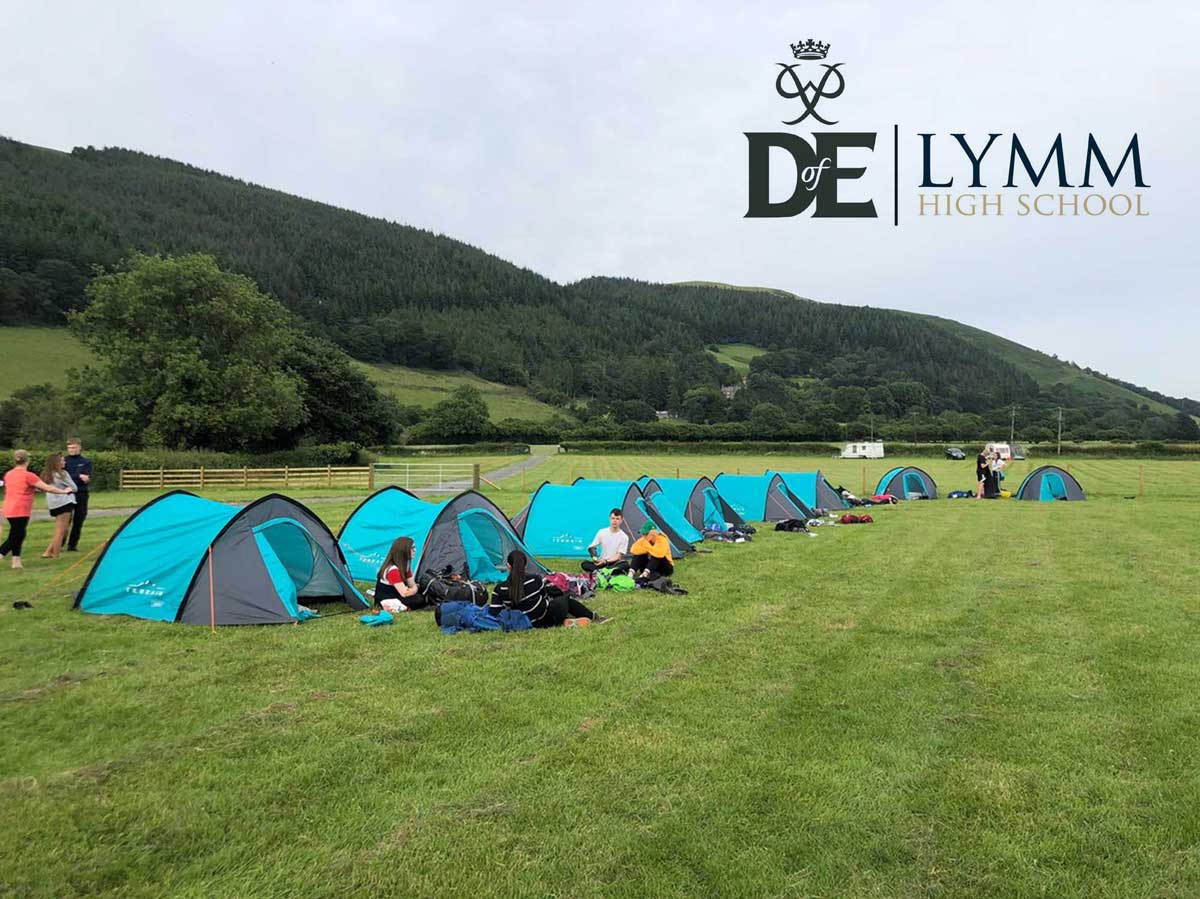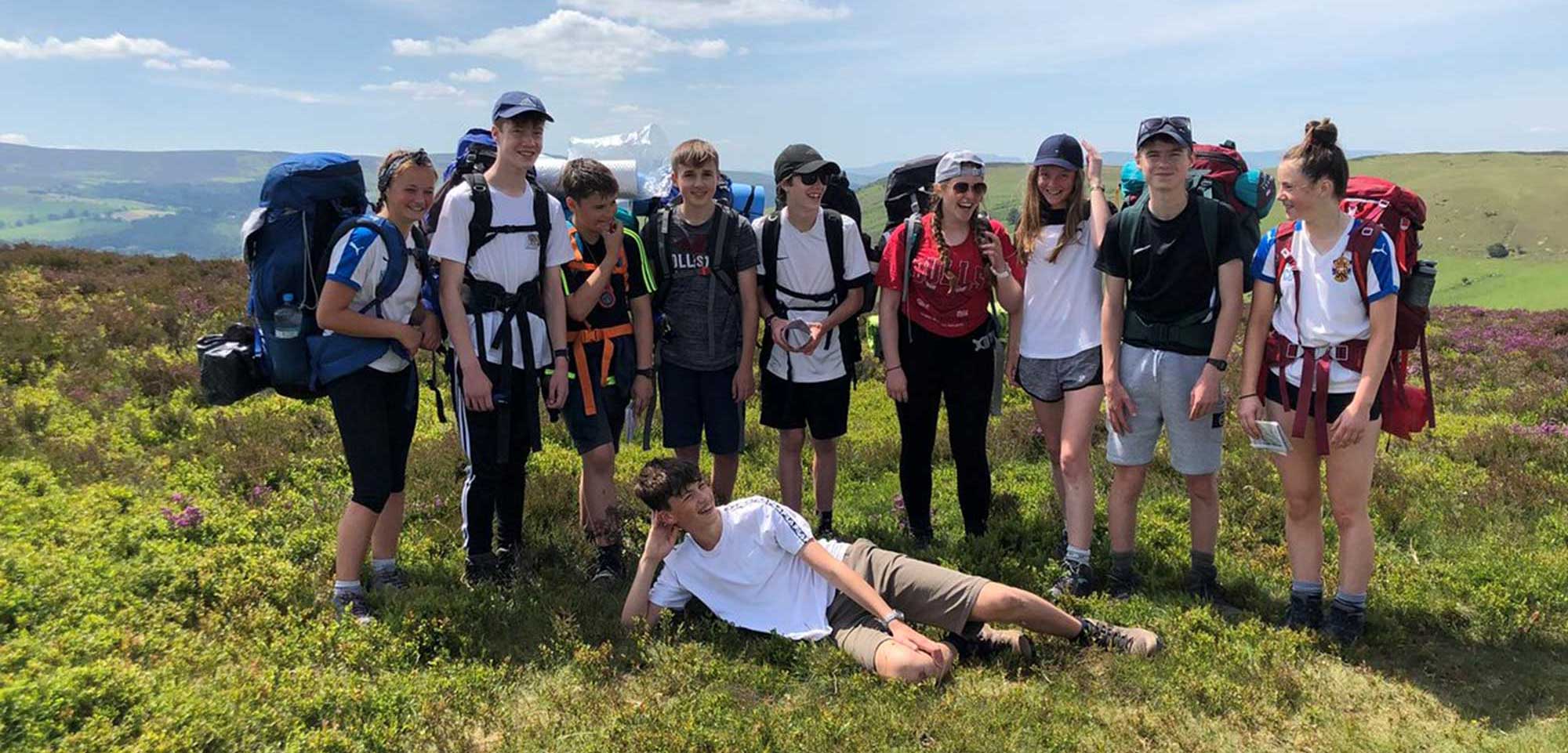

The Duke of Edinburgh award was founded in 1956 by Prince Phillip, Duke of Edinburgh, and recognises the achievements of young people completing a specified series of activities that not only benefit the young person but also their community. It was predominantly designed by John Hunt, a British army officer who had led the first successful climb of Everest in 1953.
There are a number of benefits to taking part: pushing personal boundaries; experiencing new activities and challenges; acquiring new skills; and enhancing a CV. DofE also makes participants highly attractive applicants to universities and potential employers. The awards are endorsed by a number of corporate supporters including Starbucks, FedEx, British Gas, ITV, Halfords, Google, Marks & Spencer, Unilever, Barclays and Royal Mail. DofE helps participants develop leadership, teamwork, self-motivation, communication, confidence, consideration and the ability to learn.
There are 3 progressive levels: Bronze, Silver and Gold. At Lymm HS, we run DofE programmes in the following year groups:
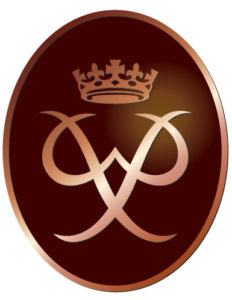 |
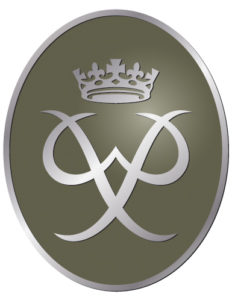 |
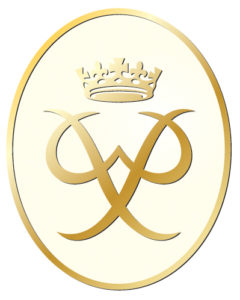 |
| Year 9 BRONZE | Year 10 SILVER | Year 12 GOLD |
Participants embarking on the Silver Award do not need to have completed the Bronze award beforehand; similarly, participants about to start the Gold Award do not need to have completed the Bronze or Silver Awards, although they will find completing the award more straightforward and shorter if they have done.
The DofE award scheme aims to encourage independence, responsibility, organisation and communication by participants. When students first sign up, they will be registered on eDofE (the online DofE system) with staff support, where they’ll complete their personal details, create log in information and set the timescales for their Volunteering, Physical and Skill sections. After that, it is the student’s responsibility to choose an activity for their 3 sections, set their aims (including choosing an Assessor) and then complete the chosen activity for the timescale set. Whilst students will be supported whenever they need and encouraged, they will not continually be prompted to complete their eDofE logging as the award dictates that participants should show independence and be responsible for these aspects themselves. We encourage parents to use their child’s login information regularly to check on their progress.
The timescales for each award are shown below:
| Volunteering, Physical & Skill sections | Expeditions | |
|---|---|---|
| Bronze |
Sections to last: |
Expeditions x 2 |
| Silver |
Sections to last: |
Expeditions x 2 |
| Gold |
Sections to last: |
Expeditions x 2 Residential – 5 days |
* The timescales shown for these awards assume participants have not completed the previous award. Timescales will be reduced in one of the sections where students have completed the previous award – please see Assembly PPT or DofE website for full details.
DofE is an integral and long-standing element of our extra-curricular programme in school, however our biggest priority is to ensure our students leave school with the best possible set of qualifications they can. As such, we want to reduce the inevitable pressure in students’ final year of GCSEs and A-levels, but nevertheless provide opportunities to complete DofE at other times. If your child still wants to complete a DofE award during Year 11 or Year 13, there are many other Licensed Organisations who run DofE programmes, for example Scout and Guide groups, Cadets and Church groups.
All letters and expedition information are placed on the school’s website under Enrichment/Duke of Edinburgh’s Award and links will be sent to parents via the School Gateway.
Unfortunately, yes, participants do need to commit to the training day in full (and training walk for Gold), the practice expedition and the qualifying expedition in order to successfully complete their DofE award. As a school we have trialled a number of different approaches to DofE training but ultimately, we feel our current model is best considering participants’ safety when on DofE expeditions and prepares them most effectively to pass their DofE award. The training day forms part of the award itself and teaches participants the skills they will need to successfully complete their expeditions. It will include basic navigation, cooking a meal, using a stove, pitching a tent, packing a rucksack and first aid. The training walk for Gold students has been included for some cohorts (post-Covid) that have not had full opportunities to complete Bronze and Silver awards so that students are adequately prepared for their award, especially given the demanding nature of the Gold expeditions.
There are 4 sections to complete for Bronze and Silver (each for differing periods of time) and 5 sections for Gold:
Volunteering – undertaking service to individuals or the community
Physical – improving in an area of sport, dance or fitness activities
Skill – developing practical and social skills, as well as personal interests
Expedition – planning, training for and completion of an adventurous journey in the UK
Residential (Gold award only) – a 5-day residential involving staying and working away from home whilst completing a shared activity. The Residential should be completed with people the participant does not know. Please check with school about your intended residential before committing to it in case it cannot be approved. Many residentials can be arranged with little or no cost to participants although there are plenty of companies marketing expensive versions so students may want to spend time researching what they are going to choose carefully.
Participants should complete their Volunteering, Physical and Skill sections for approximately 1 hour each week for the duration of the time period and aim to have completed these (inc. uploading Assessor Reports) by the date of their Practice expedition. For their 3 sections, participants must be monitored and assessed by someone with knowledge of their chosen activities; this person is termed the ‘Assessor’. Students must also ensure the activity they have chosen is on the Approved List (see DofE Documents on our website) – this will guarantee the section can be approved successfully when complete. Please be aware that parents or family members cannot act as ‘Assessors’ for a participant’s Skill, Physical or Volunteering sections.
There are a vast array of activities to choose from – participants need to check the official Approved list of possible activities on the official DofE website (www.dofe.org/sections) or under DofE Documents on the school website.
The intention is that all students will successfully complete their DofE award during the academic year in which they started. We currently have around 300 students participating in DofE programmes at any one time; it is therefore essential that students are disciplined about setting their aims and logging their evidence so their 4 sections and ultimately their award can be successfully approved. However, we understand that sometimes in exceptional circumstances a student may have difficulty completing part of their award. Due to the numbers of new students wishing to start DofE each year in the above year groups, we unfortunately cannot transfer a student to another academic year to complete missed expeditions but there are other options, and we will always do our best to help you and your child find a solution and finish their award.
Students can always continue to complete their DofE award at any point until their 25th birthday. Once a student leaves Lymm HS, we will archive their eDofE account and therefore cease to monitor further progress if incomplete, but hopefully they will choose to finish the award with another organisation; many universities offer DofE for example.
We are currently a Direct Licenced Centre (DLC) for DofE, meaning we can offer, directly monitor and verify our students in accessing DofE. One of the four sections the students need to complete is the Expedition and to meet our licence agreement as well as national standards of good practice we would need to have a large group of qualified staff so they would be competent to support our students with this part of their award. Some schools are able to offer the expedition using their own staff team but at the moment we are not in a position to do this ourselves. To offer the expedition to the numbers involved we need to engage with an external provider and under our Licence this needs to be an Approved Activity Provider (AAP) as detailed on the main DofE website. We have worked with Mark Harnden and his team at Get Outside the Classroom (GOTC) since 2015; they currently run all of our DofE expeditions and training days, and this year they will also be supporting us with the awards in school. It is important to note that the cost of GOTC helping us to run the awards in school is not in any way subsidised by the cost to the participants. These extra costs are funded solely by the school.
Currently the Bronze award costs around £280; the Silver around £370, and the Gold around £440, reflecting the length of the expeditions at each level. If students are eligible for Pupil Premium, we encourage them to use their trip voucher towards the cost of the award and can also provide additional support beyond that inc. with the additional loan of equipment so please get in touch.
Some schools choose to run DofE training all year over a large number of sessions, however having run it this way in the past, we know the likelihood of students missing sessions is far greater, meaning they are not fully prepared for their expeditions. The training days are run by a number of the GOTC expedition leaders, some of whom will be running the 2 expeditions with our students and training continues on the practice expeditions where the instructors walk with the groups on their first day.
Training days will take place around January/February; any Training Walks will also take place around this time. Practice expeditions usually take place around April and May; Qualifying expeditions are usually in June or July.
A full kit list can be found under DofE Documents, but in a nutshell your child will need their own walking boots, plate/bowl/mug/cutlery, sleeping bag, matches and (ideally) a waterproof jacket, though this can be borrowed. A head torch is also useful but not essential. Other equipment that can be borrowed from our external provider includes: tent; rucksack; stove (Trangia) and fuel; and roll mat. If you do wish to purchase any items, you may wish to make use of the 15% discount available at various retailers using the DofE Participant Reward Card that all students receive in their registration pack. There are also some really useful ‘self-help’ guides on the DofE website (www.dofe.org) which give advice on what type of kit to purchase, and support with necessary skills needed for the expeditions, such as how to pack a rucksack.
eDofE is the online system where participants record and upload their aims, goals, assessor reports and other evidence of their award; in other words, a kind of ‘DofE Record of Achievement’. Participants still receive a welcome pack when they register and a logbook within this. The logbook should be used to gather Assessor Reports once a section is complete. Participants can track their progress and submit their evidence to our DofE administrator in school (Sue Hill on the eDofE website), who in turn will approve participants’ aims, activities and ultimately their evidence of completion, including the Assessor Reports.
The eDofE app is worth students downloading and is available in the Apple App Store as well as the Google Play Store.
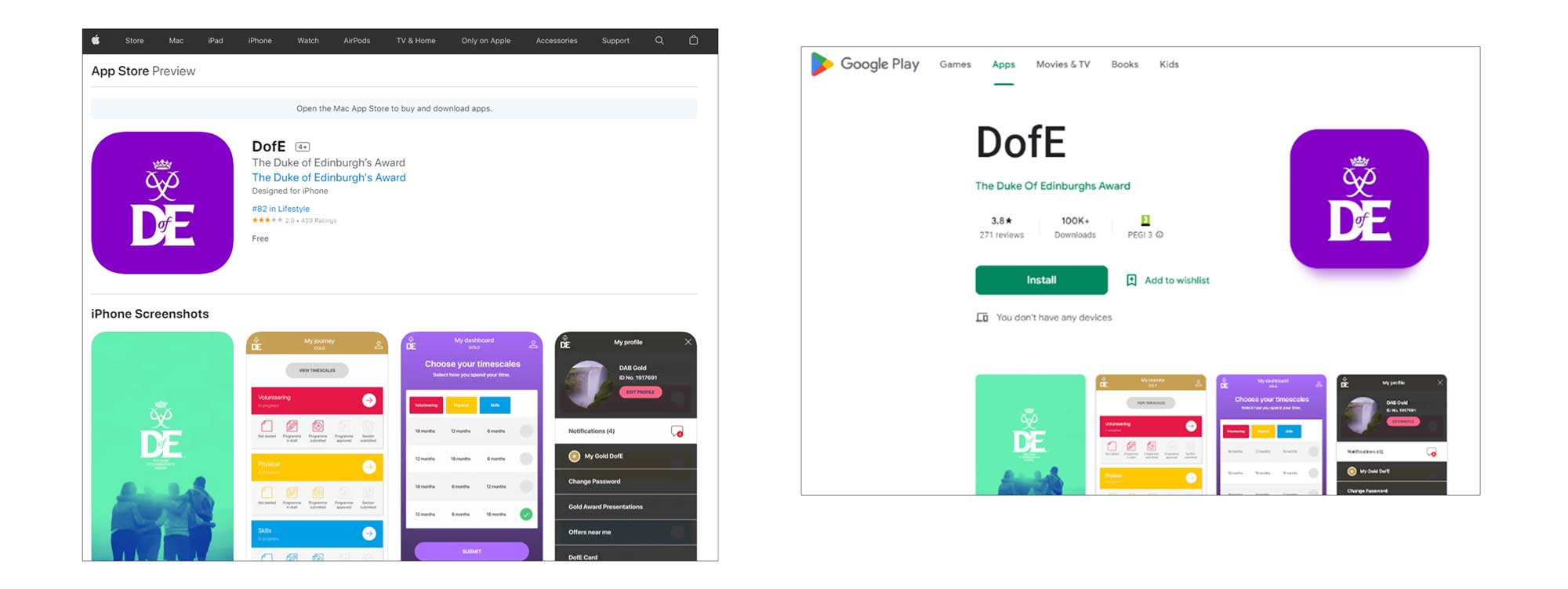
It is essential that participants log on regularly to check for alerts on their account whether on the app or the website, set their aims/goals and start dates for their sections and upload photos/Assessor Report/other evidence – there will not be formal sessions to do this once registration has been completed for all students, so it is expected that participants will complete this independently either at home or in one of the school computer rooms at lunch or after-school. There will be intermittent drop-in sessions in school, and these will be communicated to students via the student bulletin (read out by form tutors) and to parents via the School Gateway. There are also various ‘self-help’ guides relating to eDofE on the DofE website (www.dofe.org), including how to upload evidence and help with logging in.
An Assessor Report is evidence that participants must upload to their eDofE account in order to demonstrate that they have met the goals that they set for themselves and should be completed by the Assessor for that section at the end of the activity period (e.g. 3, 6, 12 or 18 months). An Assessor Report can only be in the form of one of the following:
- An uploaded scan of a completed Assessor’s Report (blank versions can be found in the logbook) – choose ‘Add Evidence’, then select ‘Other’; or
- Text copied from an email (must include start and end dates of the activity)
- A report inputted directly by the Assessor to the participant’s account via dofe.org/assessor (Assessors will need the participants eDofE ID number to do this)
Please do not take a photo of a written Assessor Report and upload under the ‘Photo’ section as these cannot be read clearly so will not be approved – instead please use one of the 3 methods above.
Students will be put in large walking groups (likely of around 10-12 students) for the practice expedition given that instructors will be walking with them for much of the time, but they will need to be in groups of 4-7 students for the Qualifying expeditions. We will keep them with friends but for the Practice expeditions, friendship groups usually need to be combined with others to create the aforementioned group sizes. Where students do not form natural groups, we will do this for them, and this will in no way limit their participation in the award. On previous expeditions, participants have shared a tent with a small number of others and formed part of a slightly larger walking group so that every person is included, even if different friendship groups join together. The tents loaned to participants are for groups of 3, though a very small number of 2s may be able to be accommodated (though unfortunately this cannot be guaranteed unless participants wish to bring their own tent). DofE is about working with new people (even though it can be scary!) and using the different skills people bring to the group to work effectively as a team to complete the challenge.
